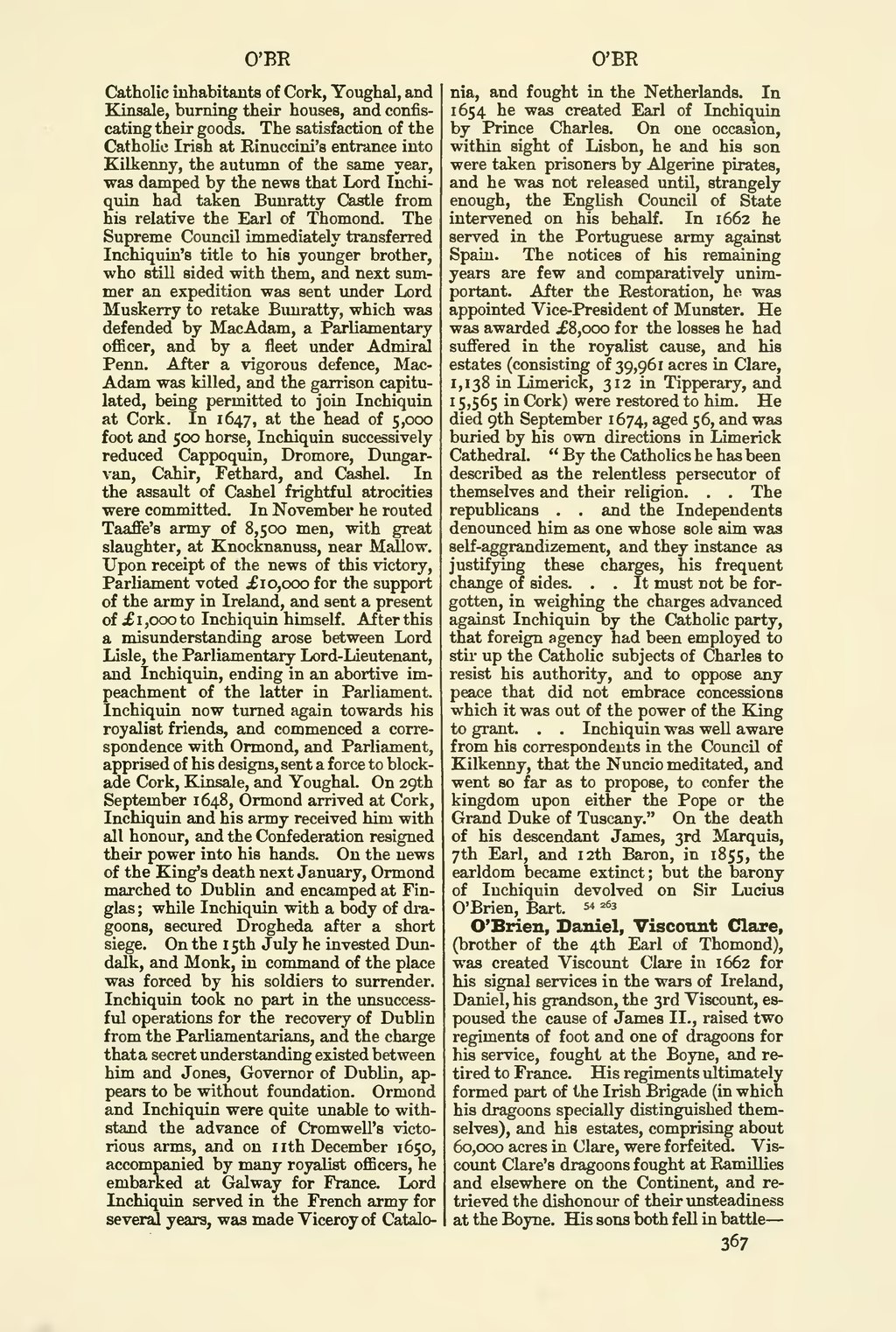O'BR
Catholic inhabitants of Cork, Youghal, and Kinsale, burning their houses, and confis- cating their goods. The satisfaction of the Catholic Irish at Einuccini's entrance into Kilkenny, the autumn of the same year, ■was damped by the news that Lord Inchi- quin had taken Bunratty Castle from his relative the Earl of Thomond. The Supreme Council immediately transferred Inchiquin's title to his younger brother, ■who still sided with them, and next sum- mer an expedition was sent vmder Lord Muskerry to retake Bunratty, which was defended by MacAdam, a Parliamentary officer, and by a fleet under Admiral Penn, After a ■dgorous defence, Mac- Adam ■was killed, and the garrison capitu- lated, being permitted to join Inchiquin at Cork. In 1647, at the head of 5,000 foot and 500 horse, Inchiquin successively reduced Cappoquin, Dromore, Dimgar- van, Cahir, Fethard, and Cashel. In the assault of Cashel frightful atrocities ■were committed. In November he routed Taaffe's army of 8,500 men, -with great slaughter, at Knocknanuss, near Mallow. Upon receipt of the news of this ■victory. Parliament voted ^10,000 for the support of the army in Ireland, and sent a present of £ 1 ,000 to Inch iquin himself. After this a misunderstanding arose between Lord Lisle, the Parliamentary Lord-Lieutenant, and Inchiquin, ending in an abortive im- peachment of the latter in Parliament. Inchiquin no^w turned again towards his royalist friends, and commenced a corre- spondence ■with Ormond, and Parliament, apprised of his designs, sent a force to block- ade Cork, Kinsale, and Youghal. On 29th September 1648, Ormond arrived at Cork, Inchiquin and his army received him ■with all honour, and the Confederation resigned their power into his hands. On the news of the King's death next January, Ormond marched to Dublin and encamped at Fin- glas ; while Inchiquin -with a body of dra- goons, secured Drogheda after a short siege. On the 15th July he invested Dun- dalk, and Monk, in command of the place was forced by his soldiers to surrender. Inchiquin took no part in the unsuccess- ful operations for the recovery of Dublin from the Parliamentarians, and the charge that a secret understanding existed between him and Jones, Governor of Dublin, ap- pears to be ■without foundation. Ormond and Inchiquin were quite unable to with- stand the advance of Cromwell's ■victo- rious arms, and on nth December 1650, accompanied by many royalist officers, he embarked at Galway for France. Lord Inchiquin served in the French army for several years, was made Viceroy of Catalo-
O'BR
nia, and fought in the Netherlands. In 1654 he was created Earl of Inchiquin by Prince Charles. On one occasion, within sight of Lisbon, he and his son were taken prisoners by Algerine pirates, and he was not released until, strangely enough, the English Council of State intervened on his behalf. In 1662 he served in the Portuguese army against Spaiu. The notices of his remaining years are few and comparatively unim- portant. After the Eestoration, he was appointed Vice-President of Munster. He was awarded £8,000 for the losses he had suffered in the royalist cause, and his estates (consisting of 39,961 acres in Clare, 1,138 in Limerick, 312 in Tipperary, and 1 5,565 in Cork) were restored to him. He died 9th September 1674, aged 56, and was buried by his ©■wn directions in Limerick Cathedral. " By the Catholics he has been described as the relentless persecutor of themselves and their religion. . . The republicans . . and the Independents denounced him as one whose sole aim was seLf-aggrandizement, and they instance as justifying these charges, his frequent change of sides. . . It must not be for- gotten, in weighing the charges advanced against Inchiquin by the Catholic party, that foreign agency had been employed to stir up the Catholic subjects of Charles to resist his authority, and to oppose any peace that did not embrace concessions which it was out of the power of the King to grant. . . Inchiquin was well aware from his correspondents in the Council of Kilkenny, that the Nuncio meditated, and went so far as to propose, to confer the kingdom upon either the Pope or the Grand Duke of Tuscany." On the death of his descendant James, 3rd Marquis, 7th Earl, and 12th Baron, in 1855, the earldom became extinct; but the barony of Inchiquin devolved on Sir Lucius O'Brien, Bart. ^4 =63
O'Brien, Daniel, Viscount Clare, (brother of the 4th Earl of Thomond), was created Viscount Clare in 1662 for his signal ser"vices in the wars of Ireland, Daniel, his grandson, the 3rd Viscount, es- poused the cause of James II., raised two regiments of foot and one of dragoons for his service, fought at the Boyne, and re- tired to France. His regiments ultimately formed part of the Irish Brigade (in which his dragoons specially distinguished them- selves), and his estates, comprising about 60,000 acres in Clare, were forfeited. Vis- count Clare's dragoons fought at Ramillies and elsewhere on the Continent, and re- trieved the dishonour of their vmsteadiness at the Boyne. His sons both fell in battle — 367
